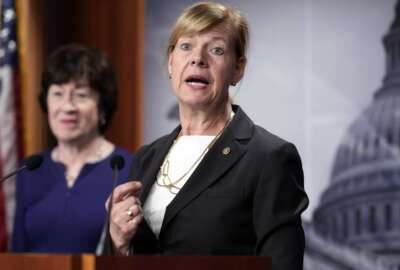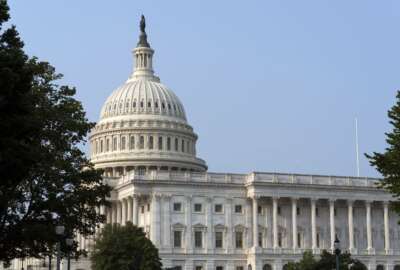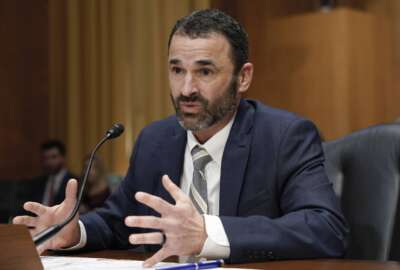Hubbard Radio Washington DC, LLC. All rights reserved. This website is not intended for users located within the European Economic Area.
VA nominee vows transformation of veterans heath care
Dr. David Shulkin led a turnaround of New York\'s Beth Israel Hospital as part of a long career in private sector hospital administration. He said running the D...
wfedstaff | June 4, 2015 8:15 pm
The nominee to lead the Veterans Health Administration told Senate lawmakers Tuesday that he intends to “transform” the country’s largest health care organization, using his private sector experience to help guide the Department of Veterans Affairs beyond the patient access problems that led to long waiting lists and falsified records in Phoenix and elsewhere around the country.
Dr. David Shulkin appeared before the Senate Veterans Affairs Committee for confirmation as VA’s undersecretary for health after a long career as a hospital administrator in the private sector and after having trained as a physician in VA hospitals early in his career. He said watching the wait time scandal unfold from the sidelines persuaded him that he could and should rejoin the department to create what he told senators would be a “new VA.”
“The VA needs change,” he said. “It needs more doctors, more nurses and greater efficiency in its systems. It needs to advance its culture of accountability and eliminate those from the system who have lost their commitment to do what’s right for veterans. The time has come to create the VA system of the future, a system that has superior access and the highest standards for quality of care.”
Shulkin would replace Dr. Robert Petzel, who resigned in May as more details of the health care scandal engulfed the agency.
If confirmed, Shulkin — whose previous posts include top positions at New York’s Beth Israel Medical Center and the University of Pennsylvania’s health system — told senators his first task would be to make sure VA follows through on its promises to solve the challenges its patients face with timely access to health care.
Career-long experience
Congress passed legislation last year granting the department authority and funding to hire more physicians, build more facilities and contract with private sector providers to treat veterans while VA builds its own capacity.
“This is what I’ve been doing throughout my career. This is basic operations,” he said. “We need to expand capacity, use weekend and evening hours and use our resources more effectively. Within the VA, 11 percent of our existing appointments are no-shows. I know how to deal with those kinds of issues. I think progress is being made, but I think we can continue to accelerate that.”
But Shulkin signaled that his vision of the future of VA medicine includes an enduring reliance on private sector care for veterans, not just as a temporary measure to fill gaps in the department’s current capabilities. He said the VA offers specialty care that can’t be matched anywhere else, but for many routine health care functions, its own medical facilities don’t have to attempt to be all things to all patients.
“The answer you come up with if you put caring for veterans at the forefront is that VA provides extraordinary care in many areas that can’t be replicated by the private sector, but it’s not yet a complete system,” he said. “I think you have to take the best of what’s in VA — which is considerable — but supplement it with the things in the private sector that the VA can’t replicate.
It’s really a transformed system where VA’s role is to handle the coordination of care. This is a different approach. We need to focus first on the veteran’s priorities.”
The Veterans Choice, Access and Accountability Act gave the department $10 billion to pay for non-VA care over the next three years.
VA’s implementation of the law has been complicated by one provision that said veterans living more than 40 miles from a VA facility are entitled to see private providers at government expense.
The department’s initial read of the law interpreted the 40-mile limitation to mean as the crow flies — a problem in many parts of the country where roads don’t necessarily run in straight lines from a veteran’s house to the nearest VA hospital. Shulkin said he supported VA’s most recent decision to alter the 40-mile rule to account for the realities of geography, but noted that the decision comes with a financial cost.
“I know the people who work in VA want to see veterans get the right care and get it in their communities, and I’m committed to that. I also know that OMB has estimated tens of billions of dollars in costs for that change,” he said. “My role if I’m confirmed is to put the veteran’s health care front and center, but also to use our resources in the best way possible.”
Growing list of priorities
Shulkin said he also would prioritize the problems of veteran suicide and ensuring that VA’s medical workforce is sized and trained to meet its mission.
He said the department’s mental health programs are already quite effective in intervening and preventing suicides — as long as veterans are able to access them. The shortcomings, he said, mostly surround the department’s capacity to conduct outreach and hire sufficient numbers of mental health professionals.
“This is one of the things that’s going well within VA: the crisis intervention centers and counseling centers that are already out there are working,” he said. “But if we’re not connecting people with those programs, that’s where our biggest problems are. We have to make sure we identify those that are at the highest risk, and we’re not doing that early enough. We also have to make sure our treatments are effective, and that’s one of the things VA is able to do: Use our research in this area, and then put it into clinical action.”
Shulkin said the department also must do a better job of recruiting and retaining medical personnel, a challenge for any health care organization given nationwide shortages in many clinical professions. But he noted that like himself, a large proportion of country’s medical professionals already begin their careers in the VA health system.
“VA is blessed by the fact that it trains 70 percent of all doctors. If they see the environment as one that puts patients first and cares for the people who work there, they’re going to want to stay. So we have to fix our own internal house first,” he said. “We also need to use best practices from the private sector like loan repayment. We need to offer competitive pay. We need to be out there using private recruiters. We need to do everything we can to get the very best people working for the VA.”
Senators also pressed Shulkin for assurances that he would protect government employees who come forward to report problems within the department.
He acknowledged that he has no experience running a public-sector organization and that he has never taken on a challenge as large as running the VHA, but asserted much of what he learned in the private sector is transferrable to the new job.
“We learned from the airline industry that if your front line people don’t feel comfortable reporting errors and near-misses, you’re never going to get better as an organization,” he said. “Part of the job of a leader is to set the culture, and it has to be a culture where people feel not just comfortable, but responsible for raising issues that hurt the organization — and in this case hurting our ability to care for veterans. It’s not only our ability to protect whistleblowers, it’s creating a culture where people feel that they should and must speak up when they see something wrong. That’s something I’ve done all my career, and I would continue to do if I were confirmed.”
RELATED STORIES:
At Phoenix VA, Obama says more work to do for veterans
VA chief backs outside medical care as new program falters
VA says it will relax 40-mile rule for private medical care
VA undersecretary Petzel resigns in wake of health scandal
Copyright © 2024 Federal News Network. All rights reserved. This website is not intended for users located within the European Economic Area.
Jared Serbu
Jared Serbu is deputy editor of Federal News Network and reports on the Defense Department’s contracting, legislative, workforce and IT issues.
Follow @jserbuWFED
IRS seeks $104B for multi-year modernization fund to maintain customer service improvements
Related Topics





